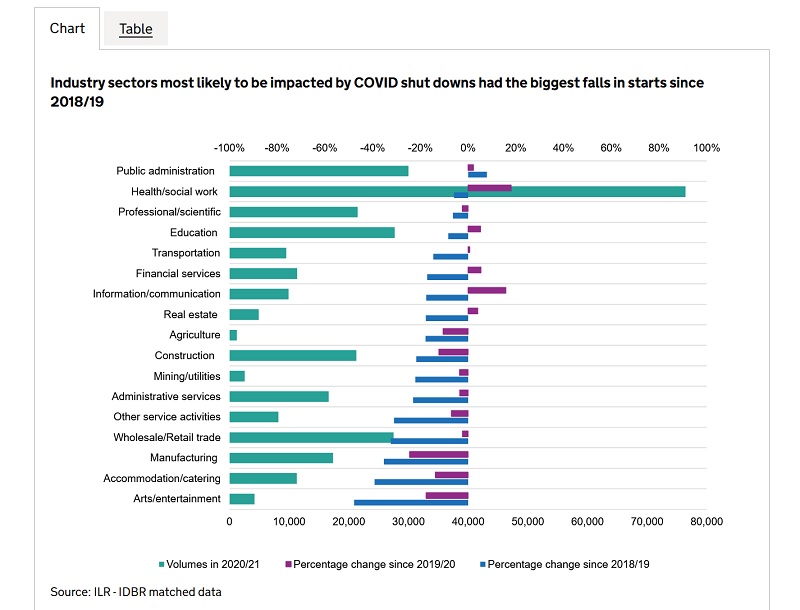Apprenticeship starts in small employers increased for the first time in five years in 2020/21 – but the numbers are still way off pre-pandemic and levy reform levels, new government data shows.
Businesses with fewer than 50 employees saw their starts numbers shoot up by 12 per cent compared to 2019/20, the first recorded increase since 2015/16.
However, this remains 45 per cent lower than in 2016/17 (pre-levy introduction) and 9 per cent lower than in 2018/19 (pre-pandemic).
The increase in 2020/21 means that small employers accounted for 30 per cent of all apprenticeship starts – up 3 percentage points on 2019/20.
Meanwhile, apprenticeship starts in medium sized employers (those with 50 to 249 employees) fell slightly by 5 per cent in 2020/21 compared to 2019/20. This leaves them 21 per cent down on pre-pandemic levels and 56 per cent lower than pre-levy levels.
In 2020/21 starts in large employers fell slightly by 3 per cent compared to 2019/20. Apprenticeship starts in large employers reached their highest level in the series in 2018/19 (224,970) but have now fallen for two years in a row. As a result, starts in large employers in 2020/21 were 20 per cent down on pre-pandemic levels and 14 per cent lower than before the levy.
The “experimental” data, revealed in today’s ‘apprenticeships in England by industry characteristics’ publication, shows that after falling for the previous three years, in 2020/21 the proportion of apprenticeship starts amongst SMEs increased to 41 per cent – 3 percentage points up on 2019/20.
However, SMEs’ share of apprenticeship starts is still lower than it was when the apprenticeship levy was introduced (54 per cent in 2016/17).
Today’s data comes a week after SMEs, particularly the larger medium-sized employers, told FE Week they are currently having to turn apprentices away because the Department for Education is refusing to reset a cap on their starts currently set at 10.
The slight rise in SME starts may have been driven by the cash incentives the government offered businesses for hiring new apprentices – of which 99,140 were claimed in 2020/21 in total. However, there is no breakdown of incentives claims by employer size, meaning it is not known how many were from SMEs. The incentives have now ended but can be claimed up to May 20.

The figures also show which sectors saw the biggest falls in terms of apprenticeship starts during the pandemic, and which industries held up.
Health and social work accounted for a quarter of all apprenticeship starts in 2020/21, and was one of the few sectors with an increase in starts (up by 18 per cent since 2019/20).
The information/communication sector also saw an increase this year as its starts went up by 16 per cent. Other sectors seeing small increases in 2020/21 were the education, financial services, public administration and transportation.
Meanwhile, manufacturing (down by 25 per cent since 2019/20) and the arts/entertainment (down by 18 per cent) sectors saw the biggest falls since 2019/20. Starts in construction fell by 12 per cent.
The DfE said that generally, industry sectors with higher proportions of apprenticeship starts at level 4 and above were more likely to have seen an increase since 2019/20, whilst those with more starts at lower levels saw falls.

















Your thoughts